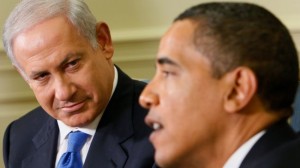 WASHINGTON�Israeli Prime Minister Benjamin Netanyahu said any comprehensive deal reached between global powers and Iran to curb its nuclear program must include Tehran's commitment to cease its threats against the Jewish state and to end support for militant Lebanese and Palestinian groups.
WASHINGTON�Israeli Prime Minister Benjamin Netanyahu said any comprehensive deal reached between global powers and Iran to curb its nuclear program must include Tehran's commitment to cease its threats against the Jewish state and to end support for militant Lebanese and Palestinian groups.Mr. Netanyahu's comments on Sunday marked his latest effort to toughen the terms of any final accord reached between the international diplomatic bloc�made up of the five permanent members of the United Nations Security Council and Germany�and Iran over the country's nuclear program.
The Israeli leader's speech also highlighted the continued divisions between his government and the Obama administration over the handling of Iran and other vital international issues, including the U.S.-led effort to forge a peace agreement between Israel and the Palestinians by next year. Mr. Netanyahu suggested during his video address to the Brookings Institution's Saban Forum that Israel was linking its support for the Mideast process to greater international efforts to deny Iran an atomic bomb.
"Our best efforts to reach Palestinian-Israeli peace will come to nothing if Iran succeeds in building atomic bombs," Mr. Netanyahu said. "A nuclear-armed Iran would give even greater backing to the radical and terrorist elements in the region. It would undermine the chances of arriving at a negotiated peace. I would say it would undermine those peace agreements that we have already reached."
The Obama administration has been attempting to form a unified stance with Israel on Iran since international powers reached an interim agreement with Tehran last month in Geneva on the nuclear issue.
The deal calls for Tehran to freeze for six months the most dangerous parts of its nuclear program�including the production of near weapons-grade fuel�in return for the West easing some economic sanctions. During this interim period, the two sides will attempt to reach a permanent agreement to end Iran's nuclear threat.
President�Barack Obama�addressed the Saban Forum in Washington on Saturday and said he believed Mr. Netanyahu should give the Geneva accord time to succeed, even as the U.S. leader acknowledged he only gave it a 50-50 chance. "Presuming that it's going to be a bad deal and, as a consequence, not even trying for a deal I think would be a mistake," Mr. Obama said.
U.S. officials heralded over the weekend one of the achievements of the Geneva accord: Inspectors from the U.N.'s nuclear watchdog, the International Atomic Energy Agency, were allowed on Sunday to inspect a facility that produces heavy water for a reactor Iran is building in the city of Arak. The watchdog said it was the first visit by its inspectors in two years and that they went back to Vienna Sunday night after the visit.
U.S. and Israeli officials worry Tehran is developing the facility to harvest weapons-usable plutonium. Iran says the Arak reactor, as well as its broader nuclear program, are purely for civilian purposes.
Mr. Netanyahu on Sunday continued to attack the Geneva agreement, arguing that it didn't do nearly enough to dismantle Iran's ability to make nuclear weapons. The Israeli leader is seeking for the U.S. and its international partners to demand a complete cessation of any production of nuclear fuel in Iran; Mr. Obama on Saturday said such a position was no longer realistic.
Mr. Netanyahu for the first time on Sunday said an international agreement with Iran must go beyond the nuclear issue and address Tehran's support for the militant groups fighting Israel and Tehran's repeated threats to destroy the Zionist state. On the eve of last month's talks in Geneva, Iran's Supreme Leader Ayatollah Ali Khamenei referred to Mr. Netanyahu as a "rabid dog" and the Israeli population as less than human.
"[Iran] is committed to our annihilation, and I believe that there must be an uncompromising demand at the Geneva talks, for a change in Iran's policy," Mr. Netanyahu said. "In other words, there needs to be not just a change in the capability of Iran to arm itself, but also a change in its policy of genocide."
U.S. and European officials have said the Geneva talks are solely focused on the nuclear issue as Iran's development of a nuclear weapon is the most pressing threat to Israel and the international community.
Splits between the U.S. and Israel also appeared over the weekend on the Mideast peace process.
Mr. Obama told the Brookings conference he believed it was "possible over the next several months to arrive at a framework" agreement to create an independent Palestinian state. But Israeli Foreign Minister Avigdor Lieberman said a day earlier in Washington that he believed a peace accord between Israel and Palestine was years away.
Mr. Netanyahu also challenged the argument made by Messrs. Obama and Kerry that the Arab-Israeli conflict was fueling broader instability in the Middle East.
"The Israeli-Palestinian conflict is not the source of the region's problems," Mr. Netanyahu said, citing the civil war in Syria and Iraq's sectarian violence. "That reality has finally debunked that myth."
By The Wall Street Journal
The Iran Project is not responsible for the content of quoted articles.










